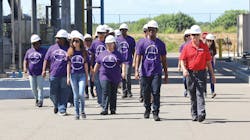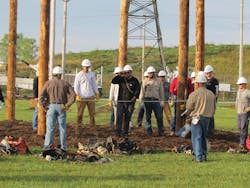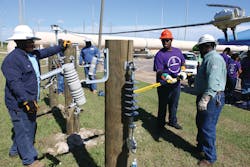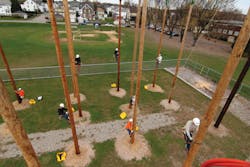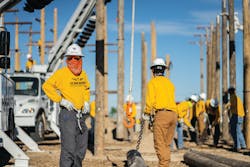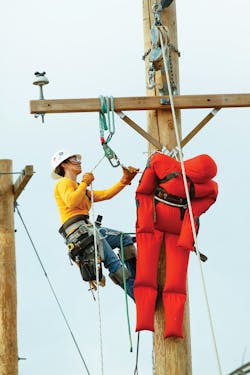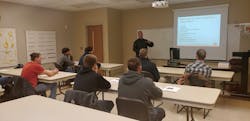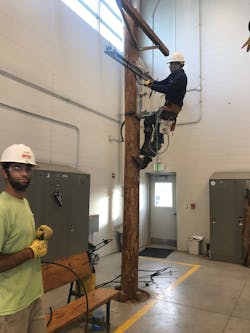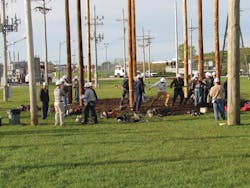Recruiting the Next Generation of Linemen
Twenty years ago, Ben Feliz of Clark Public Utilities saw the “Silver Tsunami” coming. More veteran linemen were retiring from the trade, and less recruits were coming in to fill their work boots — creating a skilled worker shortage. Today, electric utilities and contractors are focusing on bringing more apprentices on board, but it is easier said than done, he says.
“We’re doing it now, but we got behind for a while and were not putting enough emphasis on it,” said Feliz, who has spent four decades in the line trade and was recently promoted to an emergency coordinator manager. “I think we could do a better job as an industry with our quota for the number of apprentices and journeymen. Nationally, our infrastructure is in dire need of rebuilding, and it’s going to take a lot of journeymen linemen to do that. I’m not sure we have done our due diligence. Linemen are leaving for more lucrative opportunities in construction.”
As a former transmission and distribution manager, Feliz managed the work for a team of 45 workers including superintendents and linemen for his Vancouver, Washington-based public utility. As a manager, he was responsible for budgets, equipment contracts and hiring more employees.
“You tried to read the crystal ball to see when it is time to make changes based on the growth,” Feliz said. “You must decide if you need to hire more staff, but the challenge is finding qualified journeymen linemen. To stay ahead of that, it’s like reading the tea leaves.”
Instead of sitting back and waiting for the linemen to flow in, however, Feliz has taken a proactive role in recruitment. For the last 39 years, he has visited line colleges and high schools to create awareness about career opportunities in the line trade. Not all high school graduates are college-bound, but the trades offer limitless opportunities for those with a strong work ethic and passion for helping others, he said.
“It’s such a rewarding career because you can provide a service to the end user or customer that you can’t live without,” said Feliz, a member of the advisory committee for VOLTA, part of the Northwest Line JATC and Contractors Association. “A lot of them what to know what line work is all about, and I show them how the career can lead you to different places depending on your desires. You can make a really good living and fairly high salary once you complete your apprenticeship and put some time into the trade.”
Creating Partnerships
Not only Clark County PUD, but also other utilities and line schools are also doing their part to counteract the effects of the Silver Tsunami and bring in the next generation of linemen. With 113 transmission and distribution line technicians and 21 metro and rural troubleshooters, Omaha Public Power District (OPPD) expects the number to remain steady through retirements and hiring over the next five years. At the same time, however, the need for skilled workers in the line industry is growing.
“The number of older, more experienced line techs reaching retirement age and leaving is staggering when you take into consideration the total years of experience you lose in just a few retirees,” said Brandon Parmer, OPPD field supervisor. “Those years of experience and knowledge just don’t come overnight. Many times, the stories you’ve heard on the line dock a hundred times serve a valuable life lesson learned the hard way.”
A line technician never stops learning on the job, and it takes four years for a line tech to get to the journeyman level through the apprenticeship program. For that reason, OPPD prefers to take applicants who have graduated from an approved utility line program.
“This shows that the individual has committed themselves to the rigors of working outside in the elements,” Parmer said.
Over the last 30 years, high schools have seemed to shy away from promoting and providing curriculum in the trades altogether. To combat this challenge, some utilities are becoming more competitive with higher starting wages to capture more individual responses. Many colleges are partnering with utilities and turn to social media to help promote their needed trades.
“The awareness of line trade opportunities has changed dramatically through the popularity and use of social media,” Parmer said. “This has definitely increased the sharing of many subjects. More and more people share information through theses platforms between utilities ranging from safety subjects and industry trends to position openings.”
The JATC leadership at OPPD has taken an active role in renewing relationships with the two Nebraska colleges offering utility line programs.
“We participate in their mock interview sessions as well as give presentations to the classes on our company culture, various projects that we undertake, what we look for in potential employees and our selection process including the boot camps,” Parmer said.
OPPD began the boot camp style selection process in 2011 through a partnership with WESTAR utilities.
“They came to our facility and demonstrated their process in a live boot camp,” said Tim Potts, OPPD field supervisor. “The idea is to simulate working a day-long storm.”
During the boot camp, OPPD monitors and evaluates the applicants based on their attitude, ability, teamwork and communication skills.
“We have them perform tasks that simulate back alley work throughout the day,” Potts said. “This process has been very successful in hiring quality candidates.”
In the first boot camp, OPPD was able to draw apprentices with a few years of experience. The utility has noticed in its last couple camps, however, it is getting more applicants with less than a year of experience as the industry is becoming more competitive.
“In order to draw applicants, we have been partnering with local line programs and turning to social media to widen our applicant base and advertise our openings,” Potts says. “We hope to see a larger pool for our next camp later this summer.”
The company, which will soon be hiring journeymen linemen and apprentices in two upcoming camps this year, also employs about seven line tech interns every summer combined from both schools to help with their credit hour requirements to graduate. OPPD also actively participates in the multi-state college line tech rodeo every year. In return, the colleges have invited OPPD to become members of their respective advisory boards to help shape curriculum to match industry needs and trends.
In addition, OPPD participates in the nationwide Legacy Program, spearheaded by OPPD CEO Tim Burke, that partners with local metro area high schools to encourage and recruit younger people to pursue college programs coinciding with careers at the District. The selected individuals have the opportunity to participate in a separate summer internship program to give them a hands-on experience in their field of choice ranging from engineering and accounting to metering and line technicians.
Also, at the high school level, the company regularly delivers informative/career presentations to educate youth on electrical energy dangers and possible lifetime rewarding careers in our industry.
“In these presentations, the line techs like to bring various tools and safety items for the students to try on and get a feel for,” Parmer said. “These presentations highlight the tremendous reward and satisfaction line techs gain in their trade by helping the public every day and especially during storm restoration events.”
Taking a Multi-Pronged Approach
By 2023, the nation will need about 29,000 linemen, according to the Center for Energy Workforce Development (CEWD). To work toward a proactive approach to the labor shortage, Duke Energy and hundreds of other utilities are members of CEWD, a national, nonprofit consortium of electric, natural gas and nuclear utilities and their associations.
“CEWD was formed to help utilities work together to develop solutions to address the expected workforce shortage in the utility industry,” said LaTonya King, director of workforce development for Duke Energy. “The industry has worked really hard over the last decade to advance career awareness initiatives focused on technical trades, including line technicians, by leveraging CEWD’s Get Into Energy career awareness resources, which target youth, women, military and transitioning workers.”
Currently, Duke Energy has about 2,500 line technicians working across the enterprise.
“While we don’t anticipate significant increases in that number, the industry continues to need a steady stream of talent to meet the changing needs of our business and replacements for workers that retire or leave the company,” King said.
Duke Energy is focusing on a variety of different strategies to inspire more young Americans to pursue a career in the line trade. For example, the Duke Energy Foundation’s grant program, which is specifically focused on K-12, concentrates on STEM programs and puts technology in the hands of school-aged children. At the Pinellas County Education Foundation in Florida, Duke Energy's $252,000 grant expands STEM education for nearly 40,000 students, including providing a STEM After-School Program in every Title I elementary, middle and high school in the county.
In addition, Duke Energy’s workforce development grants have helped to train workers nationwide often in partnership with local colleges, including a program for energy workers at Lake-Sumter State College in Leesburg, Florida. At a state level, Duke Energy works with organizations like the Florida Energy Workforce Consortium, and locally within its communities, it work with schools like Lake Sumter State College to help fund and support lineworker curriculum programs, in addition to working with local high schools to expose students to careers in energy.
“Through these efforts, we have chipped away at the narrative that a four-year degree is the only measure of post-secondary success,” King said. “While we’ve made progress, this will be an ongoing effort to continue to attract highly skilled and motivated talent to the industry.”
Most recently, on June 11, the Duke Energy Foundation awarded more than $240,000 in grants to five South Carolina organizations focused on building and enhancing strategic engineering initiatives to grow the energy industry’s workforce of tomorrow. For example, the initiatives include expanding engineering studies in public schools and giving college students hands-on access to latest industry equipment. One project will create mobile career simulator to be used statewide.
Duke Energy is also a strong supporter of diversity and inclusion. Case in point: the utility partners with the local Urban League to conduct boot camps to increase interest and also help applicants with the application process. Also, back in 2012, the African-Americans in Progress (AAP-FL), a legacy Progress Energy employee resource group, collaborated with the Florida Chapter of The American Association of Blacks in Energy (AABE) to host the first ever Youth Energy Academy. Since then, the program has grown and expanded to include Orlando Utilities, Siemens, and more recently, Talquin and SECO.
Throughout the year, students can participate in two-day field trips, which include a variety of experiences. For example, they have the opportunity to explore a plant, tour Siemen’s Wind Training Center, go up in a bucket truck, try on personal protective equipment and attend classroom time in between.
“It’s a mix of hands-on experience and classroom time to learn and explore these careers,” said Ana Gibbs, Duke Energy Florida lead communications consultant. “Many people aren’t familiar with all the career opportunities available in the energy field. And, most people would never have the opportunity to have this type of up-close encounter with touring a plant, flying 150 ft in the air in a transmission bucket or experiencing what it feels like to put real lineman rubber gloves on.”
Providing Hands-On and Academic Training
With more than 2,300 lineworkers, FirstEnergy is keeping up with the rate of retirements by making one-to-one replacements.
“Overall, the number of lineworkers in our company should remain steady, although we’ll continue to adjust to meet the demand of our customers,” says Rob Petit, supervisor for Power Systems Institute (PSI), FirstEnergy.
Several factors may influence the utility’s numbers in the future, Petit says. For example, while ongoing reliability and grid modernization projects require more lineworkers, they also increase automation and make FirstEnergy’s system more efficient, thereby reducing the need for day-to-day maintenance.
“The need for skilled workers is essential to our business,” Petit says. “It is challenging to find individuals in the external market who can come in and contribute immediately. The skill sets needed to work safely and effectively with high-voltage electricity are not common outside the utility industry.”
As a result, FirstEnergy developed PSI, a two-year program designed to provide hands-on and academic training to best equip employees with the skills needed to be successful in the line industry. Graduates of the program have the skill set needed to be a lineworker, as well as an associate degree when they are hired into FirstEnergy.
Due to the number of candidates, PSI has developed a selective process to gain entrance to the PSI program. Before anyone is accepted into the program, they must undergo several physical assessments and prove they are academically ready to succeed in a college environment. This process has resulted in developing top-quality, well-educated men and women for the electric utility industry, Petit says.
“Through the PSI program that started in 2000, we’ve partnered with 11 community colleges across our footprint,” Petit says. “We recruit at partnering colleges, high schools and vocational schools in each state. Our turnout at these recruitment events is impressive. We consistently have many more candidates than seats available in the program, although the seats vary by year. Due to the social distancing protocols necessitated by the COVID-19 pandemic, FirstEnergy was only able to have only 90 seats available out of the traditional 150 for this year’s line worker program.”
Moving forward, the utility is concentrating its efforts on increasing its diverse candidate pool. For example, FirstEnergy is recruiting under-represented portions of its communities. In addition, FirstEnergy is actively seeking out military veterans to join the lineworker ranks. The utility has engaged third-party vendors to promote the PSI program by email and other targeted advertising channels. FirstEnergy participates in energy industry collaborations to benchmark what others are doing to strengthen its efforts to recruit veterans, who typically do well in the PSI program.
“The experience and work ethic they bring often makes them strong leaders with an uncompromised focus on safety and service,” Petit says.
To succeed in the line trade, workers must be able to work safely, both around electricity and in multiple environmental conditions.
“The individual must be able to work at heights, in cold and hot weather, rain, snow and on beautiful days,” Petit says. “We try to identify those individuals who will thrive in an environment where you look out for your own safety as well as the safety of your coworkers and the public. Our PSI program trains line workers to have the technical skills needed to be a lineworker, but also a mindset focused on working safely, no matter the challenge.”
Training the Next Generation
Over the last 25 years, Northwest Lineman College (NLC) has become an educational institution providing safety and certification training in the power delivery, natural gas and telecommunications industries. NLC offers entry-level career programs to advanced industry training for companies. With the growth of mobile training, NLC has developed ways for companies to receive training with specialized simulators at their own facilities. Altogether, NLC trains 8,000+ individuals each year.
“Since NLC’s founding, we have always been dedicated to doing what’s best for the student,” says Eric Eriksen, Texas Campus President. “The training we provide supports our country’s critical utility infrastructure. Those working in these trades have a rich history and highly respected reputation in the community, often working in treacherous conditions while serving our country.”
With campuses in Idaho, California, Texas and Florida, NLC attracts students from across the nation ready to start long and rewarding careers.
“Over the years, NLC has improved its recruiting partnerships,” Eriksen says, “NLC is partnering with utilities and cooperatives nationwide to help recruit and train their workforce.”
NLC’s reach was broadened when the company was acquired by Quanta Services, a specialty contractor with the largest craft-skilled workforce in North America.
“The Quanta acquisition allowed NLC to continue to do everything we were already doing for the industry, yet provide so much more opportunity for our students,” says Eriksen. “We not only train them to do the job, but we also give them the industry education and career-planning skills they need to be highly effective at getting the job. “
At the end of the day, new people entering the workforce need strong and steady careers, and utilities and contractors need workers, Eriksen says.
"Our entry-level career programs exist in the middle, providing excellent training to the individual but also strategizing new ways to help employers find qualified workers ready to invest in long-term careers,” he says.
NLC’s educational approach is rooted in its Three-phased Educational Model. The Model focuses on the three domains of learning: Knowledge, Skill, and Behavior.
“This, along with maintaining a positive learning environment, sits at the core to everything we do at NLC,” he says.
For its entry-level programs, NLC’s Admissions Team gives prospective students personal time and attention. Admissions consultants provide information regarding the industry, career opportunities and the requirements of the program.
Students are trained by NLC Training Specialists, dubbed the “Maroons,” who come into the role with rich experience in the trade. Once at NLC, these tradesmen go through NLC’s in-house professional technical educator courses to learn how to effectively teach to adult learners and gain confidence in the classroom.
“Our instructors are professional educators,” Eriksen says. “We never send new hires straight into the classroom. To output highly qualified graduates, we have to ensure our Maroons are also extremely qualified for the educational role we put them in.”
To succeed at NLC and ultimately, in the trade, students must have a diverse skill set.
“They must have a high physical stamina like a professional athlete and have a servant mentality like our nation’s military,” Eriksen says. “Graduates must be ready to deal with complex challenges in physically demanding situations—and NLC helps to prepare them.”
Though NLC does not spare students from tasting the real challenge of the work, they do promote a positive learning environment, focused on instilling good behaviors where students are challenged and encouraged to succeed. Students are placed in crews where teamwork is emphasized daily.
“We want our graduates to be successful, not only for them and their families but also for the employers they go to work for,” Eriksen says.
The ability for a graduate to begin a successful career in less time than with a traditional four-year college is very attractive to high school graduates. Not only do they find careers quickly, but they can find stable, high-paying jobs without the same financial barriers associated with a four-year college.
With the GI bill, veterans transitioning from the military also have great opportunity to fund their career training.
“NLC is grateful to our men and women in service, and we are proud to have military veterans on staff and to have helped many veterans transition into successful careers,” Eriksen says. “Becoming a utility worker is a natural fit for those with a background of military service. Many veterans have developed highly valued skills such as critical thinking, leadership and integrity—which are also important in our industries.”
About the Author
Amy Fischbach
Electric Utilities Operations
Amy Fischbach is the Field Editor for T&D World magazine and manages the Electric Utility Operations section. She is the host of the Line Life Podcast, which celebrates the grit, courage and inspirational teamwork of the line trade. She also works on the annual Lineworker Supplement and the Vegetation Management Supplement as well as the Lineman Life and Lineman's Rodeo News enewsletters. Amy also covers events such as the Trees & Utilities conference and the International Lineman's Rodeo. She is the past president of the ASBPE Educational Foundation and ASBPE and earned her bachelor's and master's degrees in journalism from Kansas State University. She can be reached at [email protected].
